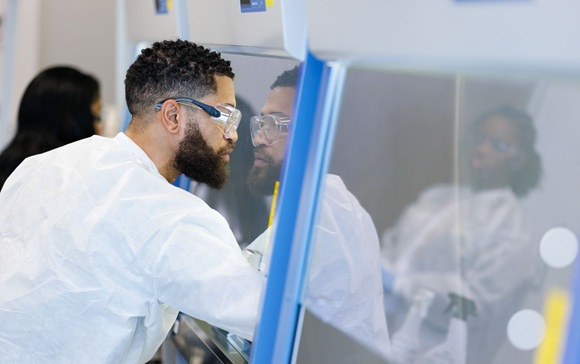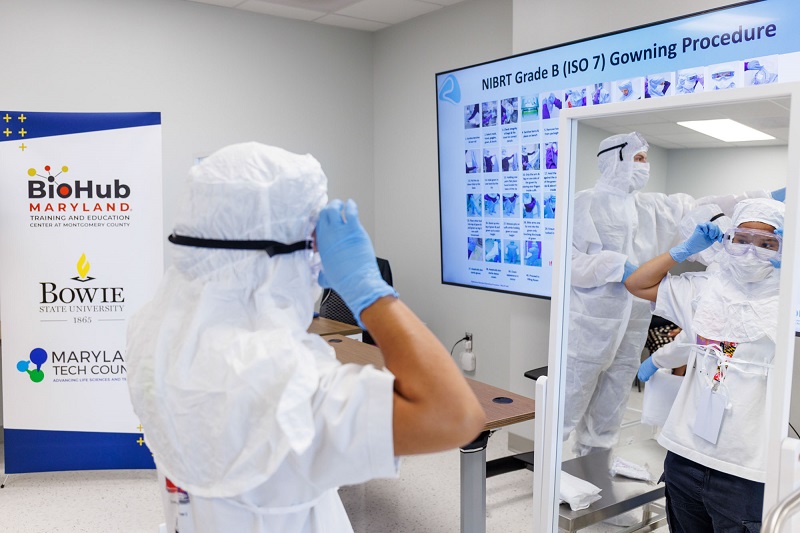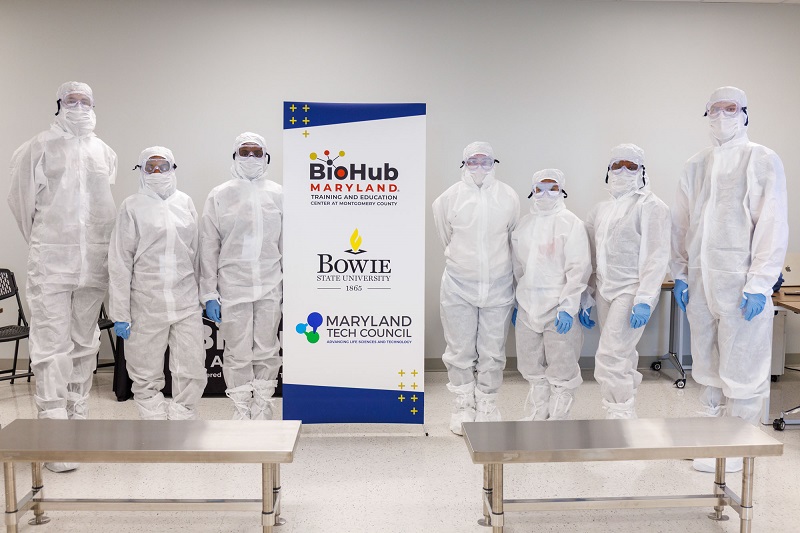Aug. 13, 2025
Bowie State Students Earn Industry-Recognized Biopharma Training Through BioHub Partnership

This summer, Bowie State University students became the first in the state to earn BioHub Maryland certification — an achievement that positions them at the forefront of Maryland’s fast-growing life sciences industry. Through a new partnership between Bowie State and BioHub Maryland, 24 students from the Department of Natural Sciences participated in immersive, lab-based biopharmaceutical manufacturing training at a state-of-the-art facility in Rockville. With hands-on experience and industry-recognized credentials in hand, these students are now equipped to compete for in-demand jobs in one of the most impactful, innovative sectors of the economy.
Over the course of four weeks, students engaged in real-world biomanufacturing processes such as upstream processing, cell culture, and quality control — all essential to vaccine and treatment production. The curriculum, designed by the globally respected National Institute for Bioprocessing Research and Training (NIBRT), culminated in BioHub certification, signaling job readiness to life sciences employers across the region.
 For Andria Gadson, a Bowie State undergraduate in biology now pursuing her master’s in applied biotechnology and molecular biology, the training offered insight into the advanced safety protocols and lab techniques required by the industry.
For Andria Gadson, a Bowie State undergraduate in biology now pursuing her master’s in applied biotechnology and molecular biology, the training offered insight into the advanced safety protocols and lab techniques required by the industry.
“We’re always taught to wear gloves and lab coats in class, but this experience took it to another level,” said Gadson. “We learned how to fully suit up in sterile environments — from hoods to booties — and used glow cream to test our ability to maintain contamination-free zones. It was challenging but exciting, and I walked away with so much more knowledge than I expected.”
Gadson believes the certification has given her a significant advantage as she prepares to enter the workforce. “Most people won’t get this kind of training until they’re already hired,” she said. “To have this under my belt beforehand puts me a step ahead.”
Wesley Hunn, a post-baccalaureate pre-dental student from Silver Spring, Maryland, also saw lasting value in the program. “This training introduced me to core techniques like aseptic handling, sterile filtration, and upstream bioprocessing. These are critical industry essentials for anyone looking to contribute meaningfully in biomanufacturing or healthcare,” he said. “As a pre-dental student, I also found valuable parallels between these practices and modern dentistry, especially in surgical procedures, implant workflows, and lab-based hygiene standards.”
Hailey Osborne, an aspiring research scientist, said the lessons on aseptic technique were particularly eye-opening. “Learning how a single wrong hand movement could contaminate an experiment really drove home the importance of precision,” she said. “This gave me a better opportunity to reach my career goals, especially having this information so early. Even for those going into medicine or other healthcare fields, the background knowledge, attention to detail, critical thinking, and sterile techniques are invaluable for patient care.”
“BioHub Maryland doesn’t just train students — it launches careers,” said Kelly Schulz, chief executive officer of the Maryland Tech Council. “By working with Bowie State, we’re ensuring a more robust pipeline of talent is ready to lead the next generation of biotech breakthroughs — right here in Maryland.”
The training was made possible through a National Institute of Standards and Technology (NIST) grant secured by Dr. Supriyo Ray, associate professor and program coordinator for the master’s program in Applied Biotechnology and Molecular Biology (ABMB), and Dr. George Ude, professor and chair of the Department of Natural Sciences.
“This program is a game-changer for our students,” said Dr. Ray. “Hands-on training in biopharmaceutical manufacturing gives them the competitive edge they need to secure employment in their field of study after graduation. This experience provided a complete overview of biomanufacturing processes, exposed them to specific job opportunities, and deepened their appreciation for the mentored research and experiential learning we provide through initiatives like CUREs.”
 “We are proud to lead efforts that connect Bowie State students directly to industry,” said Dr. Ude. “This partnership reflects our mission to ensure graduates are not only academically prepared but professionally ready for high-impact roles in biotechnology and related fields.”
“We are proud to lead efforts that connect Bowie State students directly to industry,” said Dr. Ude. “This partnership reflects our mission to ensure graduates are not only academically prepared but professionally ready for high-impact roles in biotechnology and related fields.”
Students from the Department of Natural Sciences — an interdisciplinary program that blends biology, chemistry, physics, computer science, and mathematics — represented four training cohorts. Each completed their certification at the BioHub Maryland Training and Education Center, an 8,200-square-foot lab in Montgomery County supported by state and local funding.
The center offers additional training in high-growth areas such as gene and cell therapy, vaccine manufacturing, and scientific data analysis. Through this initiative, Bowie State continues to expand opportunities for underrepresented students to gain skills, experience, and access to cutting-edge careers.
Located in the heart of the BioHealth Capital Region — ranked No. 3 in the U.S. for biopharma clusters — Maryland is home to more than 2,700 life sciences companies and 54,000 workers. This partnership strengthens Bowie State’s role in accelerating equitable workforce development and expanding access to the state’s innovation economy.
